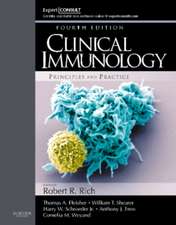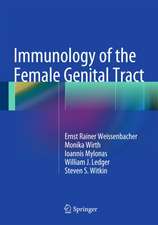Analyzing T Cell Responses: How to analyze cellular immune responses against tumor associated antigens
Editat de Dirk Nagorsen, Francesco M. Marincolaen Limba Engleză Hardback – 29 sep 2005
| Toate formatele și edițiile | Preț | Express |
|---|---|---|
| Paperback (1) | 1095.90 lei 6-8 săpt. | |
| SPRINGER NETHERLANDS – 19 oct 2010 | 1095.90 lei 6-8 săpt. | |
| Hardback (1) | 1109.59 lei 6-8 săpt. | |
| SPRINGER NETHERLANDS – 29 sep 2005 | 1109.59 lei 6-8 săpt. |
Preț: 1109.59 lei
Preț vechi: 1167.99 lei
-5% Nou
Puncte Express: 1664
Preț estimativ în valută:
212.36€ • 221.11$ • 179.46£
212.36€ • 221.11$ • 179.46£
Carte tipărită la comandă
Livrare economică 11-25 martie
Preluare comenzi: 021 569.72.76
Specificații
ISBN-13: 9781402036224
ISBN-10: 1402036221
Pagini: 328
Ilustrații: XII, 314 p.
Dimensiuni: 156 x 232 x 26 mm
Greutate: 0.8 kg
Ediția:2005
Editura: SPRINGER NETHERLANDS
Colecția Springer
Locul publicării:Dordrecht, Netherlands
ISBN-10: 1402036221
Pagini: 328
Ilustrații: XII, 314 p.
Dimensiuni: 156 x 232 x 26 mm
Greutate: 0.8 kg
Ediția:2005
Editura: SPRINGER NETHERLANDS
Colecția Springer
Locul publicării:Dordrecht, Netherlands
Public țintă
Professional/practitionerCuprins
Monitoring Antigen-Specific T Cell Responses.- Tumor Associated Antigens.- Immune Escape, Tumor induced immune suppression and immune escape: Mechanisms and Possible Solutions.- Virus Specific T-Cell Responses.- Cytotoxicity Assays Killer Lymphocytes in Cancer.- Monitoring T Cell Proliferation.- Elispot Assay, Assessment of Cellular Immune Responses to Anti-Cancer Vaccines.- Modified Elispot, Modifications of the Elispot Assay for T Cell Monitoring in Cancer Vaccine Trials.- Intracellular Cytokine Staining, Cytokine flow cytometry for characterization of tumor-specific T cell responses.- Cytometric Cytokine Secretion Assay, Detection and Isolation of Antigen-Specific T Cells.- Peptide/MHC Tetramer Analysis.- In Situ MHC Tetramer Staining, In Situ Tetramers.- MHC-IG Dimeric Molecules, Dimers - MHC-IG dimeric molecules for the analysis of antigen-specific T cell responses.- TCR Analyses, T-cell receptor CDR3 analysis: Molecular fingerprinting of the T-cell receptor repertoire.- Peptide/HLA-GFP Complexes, Detection of Antigen-Specific T Cells by Acquisition of Peptide/Hla-Gfp Complexes.- QRT-PCR, Quantitative RT-PCR for the Analysis of T cell Responses in Immunized Cancer Patients.- Microarrays, Gene expression profiling approaches for the monitoring of anti-cancer immune responses.- Concluding Remarks.
Recenzii
From the reviews of the first edition:
"This book represents the first comprehensive description, and evaluation of the most important assays utilized to monitor immune responses against tumor associated antigens. … Specifically tailored to the needs of clinical researchers, basic science investigators, and biotechnology innovators, this book provides information that is both sufficiently detailed and eloquently succinct. All discussions are substantiated with a comprehensive literature review. … Analyzing T Cell Responses provides the most substantial and extensive review of immune response-monitoring techniques available to date." (Melanie Hayden, Stephanie Schroter and Boris Minev, Angiogenesis, Vol. 9, 2006)
"This book represents the first comprehensive description, and evaluation of the most important assays utilized to monitor immune responses against tumor associated antigens. … Specifically tailored to the needs of clinical researchers, basic science investigators, and biotechnology innovators, this book provides information that is both sufficiently detailed and eloquently succinct. All discussions are substantiated with a comprehensive literature review. … Analyzing T Cell Responses provides the most substantial and extensive review of immune response-monitoring techniques available to date." (Melanie Hayden, Stephanie Schroter and Boris Minev, Angiogenesis, Vol. 9, 2006)
Caracteristici
Comprehensive review of all methods suitable for T cell responses Prepared by pioneers in each respective assay Inclusive of strategies for global monitoring at the systemic and peripheral (target organ) level








